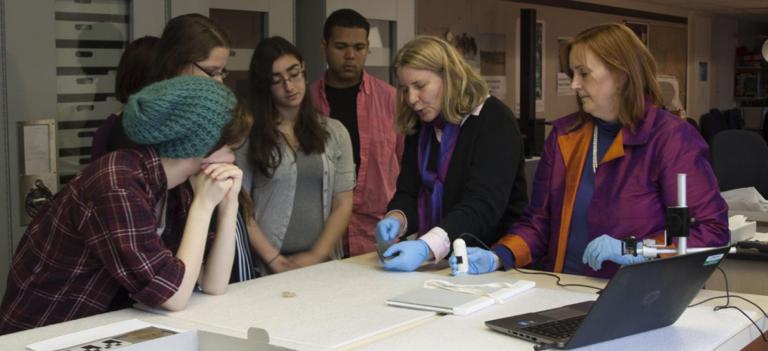
Classical and Near Eastern Archaeology Major, Minor, and Concentration (Bryn Mawr)
The Department of Classical and Near Eastern Archaeology trains undergraduates and graduate students in the archaeology of the Mediterranean and Middle Eastern worlds. The program is interdisciplinary and encourages students to take advantage of related offerings in Departments of Anthropology, Classics, Geology, History, History of Art, and the Program in the Growth and Structure of Cities.
In collaboration with the Departments of Geology, Biology and Anthropology, a concentration in Geoarchaeology is offered together with coursework and laboratory training in Geographic Information Systems. The Ella Riegel Memorial Collection of over 6,000 artifacts is used in instruction. Students are encouraged to study material for research and to volunteer with the College Collections staff, who manage the collection.
Curriculum & Courses
The curriculum of the department focuses on the cultures of the Mediterranean regions and the Near East in antiquity. Courses treat aspects of society and material culture of these civilizations as well as issues of theory, method, and interpretation.
-
Major Requirements
The major requires a minimum of 10 courses. Core requirements are two 100-level courses distributed between the ancient Near East and Egypt (either ARCH B101 or ARCH B104) and ancient Greece and Rome (ARCH B102), and two semesters of the senior conference (ARCH B398 and ARCH B399). At least two upper-level courses should be distributed between Classical and Near Eastern subjects. Additional requirements are determined in consultation with the major advisor. Additional coursework in allied subjects may be presented for major credit but must be approved in writing by the major advisor; such courses are offered in the Departments of Anthropology, Geology, Greek, Latin and Classical Studies, Growth and Structure of Cities, and History of Art. In consultation with the major advisor, one course taken in study abroad may be accepted for credit in the major after review of the syllabus, work submitted for a grade, and a transcript. Credit will not be given for a course that is ordinarily offered by the department. Students can also take courses at the University of Pennsylvania in consultation with the major advisor.
The writing requirement for the major consists of two one-semester Writing Attentive courses offered within the department.
Each student’s course of study to meet major requirements will be determined in consultation with the undergraduate major advisor in the spring semester of the sophomore year, at which time a written plan will be designed. Students considering majoring in the department are encouraged to take the introductory courses (ARCH B101 or ARCH B104 and ARCH B102) early in their undergraduate career and should also seek advice from departmental faculty. Students who are interested in interdisciplinary concentrations or in study abroad during the junior year are strongly advised to seek assistance in planning their major early in their sophomore year.
Requirements for Honors
Honors are granted on the basis of academic performance as demonstrated by a cumulative average of 3.5 or better in the major.
-
Minor Requirements
The minor requires six courses. Core requirements are two 100-level courses distributed between the ancient Near East and Egypt and ancient Greece and Rome, in addition to four other courses selected in consultation with the major advisor.
-
Concentration Requirements
Concentration in Geoarcheology
The geoarchaeology concentration allows students majoring in Anthropology, Archaeology, or Geology to explore the connections among these fields with respect to how our human ancestors interacted with past environments, and how traces of human behavior are preserved in the physical environment. In Geology, the geoarchaeology concentration consists of 13 courses: GEOL B101, GEOL B202, GEOL B203, GEOL B204, GEOL B205, GEOL B208, GEOL B270, and GEOL B399; two semesters of chemistry; two semesters of math, statistics, or computational methods; either ARCH B101 or ANTH B101; and one 200- or 300-level elective from among current offerings in Anthropology or Classical and Near Eastern Archaeology. Paperwork for the concentration should be filed at the same time as the major work plan. For course planning advice, consult with Don Barber (Geology), Casey Barrier (Anthropology) or Peter Magee (Archaeology).
Keep Exploring
More Programs
Check out our other academic offerings:
Get in Touch
Join the Mailing List or search for events in your area.
You can find detailed instructions and information on the Application Instructions page. If you need to contact us directly, please send an email to admission@haverford.edu.
Get Social with Haverford